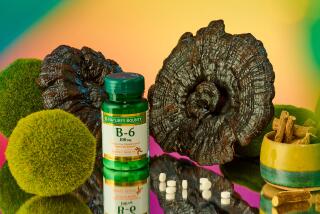Make Mine a Parkinson’s-Preventing Latte
- Share via
My child is nothing if not solicitous. Take this morning, when--as I was about to drive her to school--she suggested I tarry awhile and enjoy a nice cup of coffee while she patiently watched cartoons. That’s just the kind of kid she is.
It was, as it happens, the start of a drink-themed day. At work, I found a desk adrift with beverage items: “If that extra cup of coffee in the morning sends you running for the bathroom, you might want to rethink your drink,” brightly offered one tip sheet from the University of Texas Southwestern Medical Center. I’ll admit I mulled the possibility for a second--but then, right under that release, I found this compelling item: Coffee may protect against Parkinson’s disease. (Which, um, is why I’ve been drinking it so much. That’s right. For my health.)
Compared with nondrinkers, men who drink five cups of coffee per day halved their risk for Parkinson’s, reported the Harvard University study (of many thousands of health professionals). Women who drank one to three cups did likewise--but when they drank too much, the benefit vanished again. (Ah, the magic and mystery of epidemiology.)
Meanwhile, other scientists have found that caffeine wards off Parkinson’s in mice, which is cheering news for the rodent community but also lends credence to caffeine doing something anti-Parkinsonian in people. (Since--as geneticists are wont to remind us--we’re practically mice anyway.)
Tea news was in the paper pile as well. Remember all that stuff about green tea containing healthful chemicals? Now microbiologists are hard at work showing black tea carries some clout as well--it fends off cavities! Reduces mouth plaque! Fights viruses! Answers the phone and does light dusting and ironing on the side! So report scientists in Orlando, Fla., at the annual meeting of the American Society for Microbiology.
Don’t care for tea? Think it tastes like mouth rinse? Good news! To get the oral benefits, people in the study didn’t even drink the tea: They swilled it around and spat it out.
Finally, if you love hot chocolate but it hates you, more good news from a meeting where gustatory matters are on the minds of many. Last week was Digestive Disease Week, an occasion when liver and gut experts from all over the world come together and share findings. At this year’s fest, among thousands of presentations, Michigan scientists reported that the mystery of chocolate-triggered heartburn is a whisker closer to being solved.
During experiments in which they fed chocolate directly into people’s guts with tubes, the scientists discovered the gut responds by making extra amounts of a chemical called serotonin.
Serotonin, in turn, relaxes the sphincter separating the esophagus from the stomach, causing acidic liquids to surge upward. Giving a drug that impedes the serotonin down there--presto!--results in less upflow. Coming soon to a Godiva store near you.
Acne Fallout, Dirty Money
Gut disorders, though fascinating, are not quite as lighthearted and fun as the antics of microbes. So we’ll finish with a few more items from the American Society for Microbiology.
* Is teenage acne endangering us all? Treating acne with antibiotics can trigger evolution of antibiotic-resistant microbes, say Swedish researchers. They call on doctors to rethink current acne treatment policy.
* Is money endangering us all? Paper currency harbors germs that can cause disease, according to an experiment in which dollar bills were collected at a food concession stand in Ohio and then sampled to see what bugs grew.
* Are kitchen sponges endangering us all? You thought money was bad? Fresh Brazilian data on the “how many bacteria reside on a kitchen sponge” question confirms that there are indeed millions of them on there.
* Are cola can lids. . . OK, enough. I’m going to go read about liver lesions instead.
*
If you have an idea for a Booster Shots topic, write or e-mail Rosie Mestel at the Los Angeles Times, 202 W. 1st St., Los Angeles, CA 90012, rosie.mestel@latimes.com.
More to Read
Eat your way across L.A.
Get our weekly Tasting Notes newsletter for reviews, news and more.
You may occasionally receive promotional content from the Los Angeles Times.







